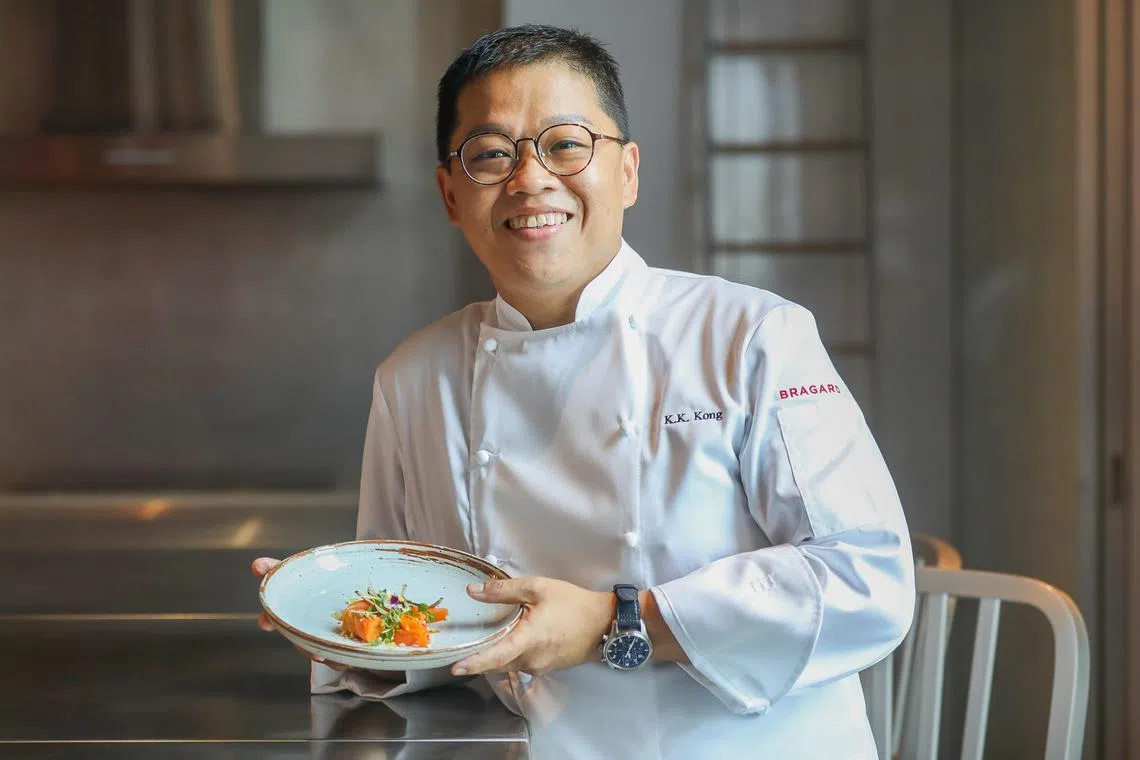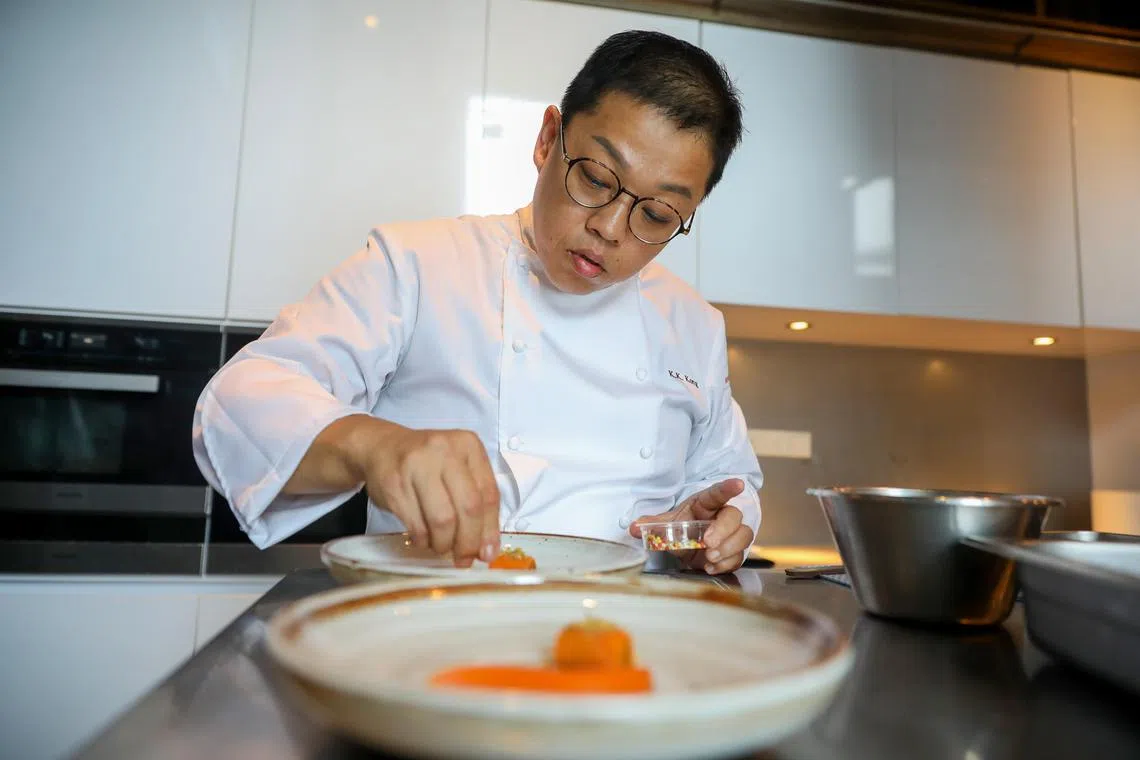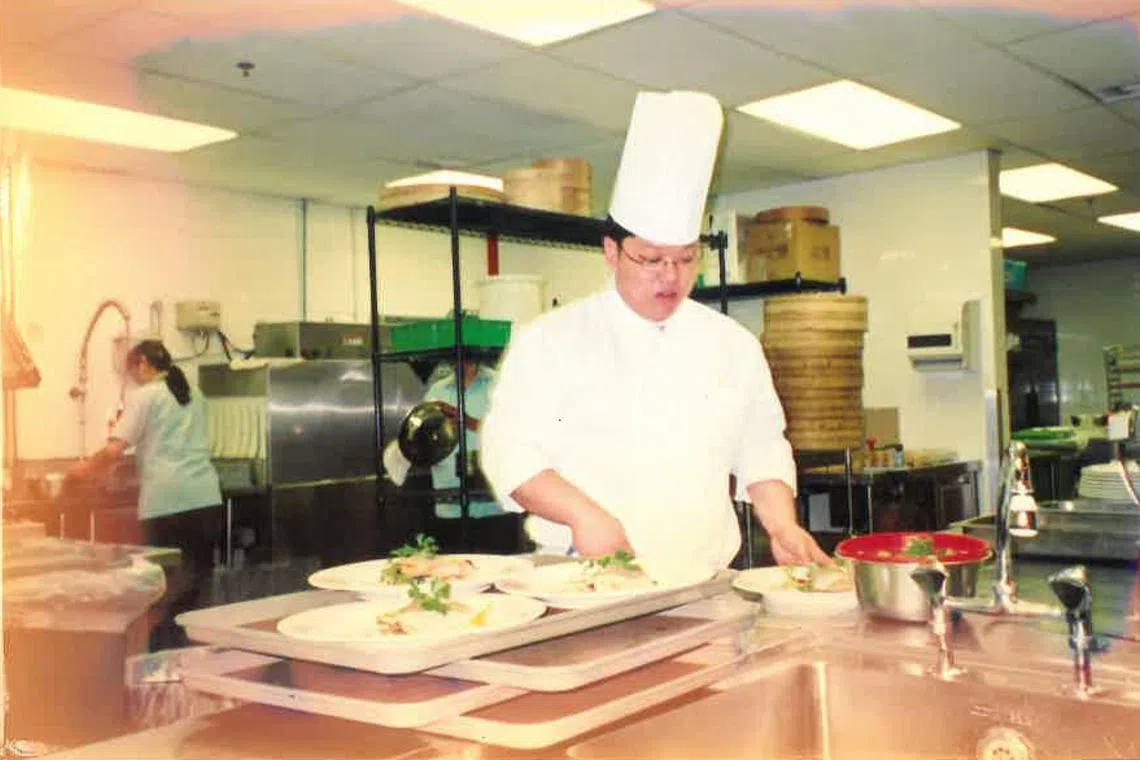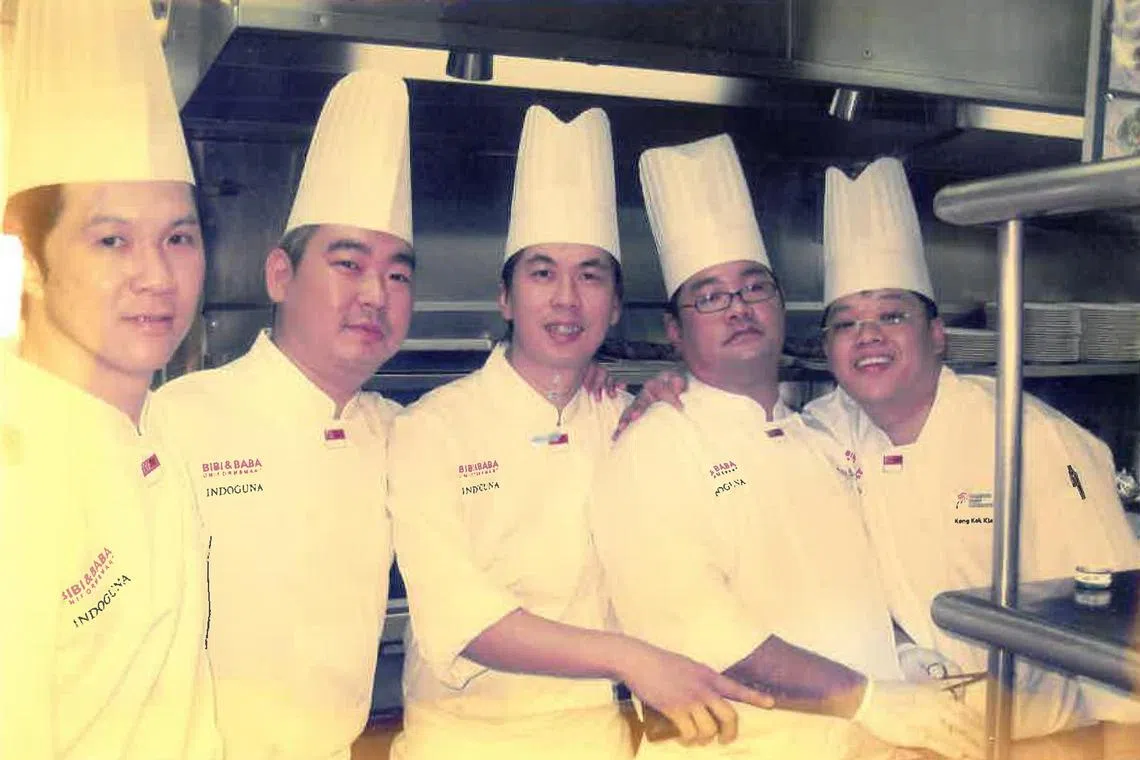School of grit: He failed N levels, became an award-winning chef and is now studying for a degree
Sign up now: Get ST's newsletters delivered to your inbox

Chef Kong Kok Kiang failed his N levels, but is now an award-winning executive chef at Sentosa Golf Club.
ST PHOTO: LUTHER LAU
Follow topic:
SINGAPORE – Growing up, chef Kong Kok Kiang’s idea of an “atas” (Malay for high-class) meal was the occasional treat at KFC, which then served its fried chicken on dinner plates with stainless steel cutlery.
The Jing Shan Primary School and Teck Whye Secondary School boy had never been to Orchard Road or heard of a fish called salmon.
When he received his N-level results in 1992, he realised that his grades – one B4, three C5s and one ungraded subject – did not allow him to move on to the O levels.
He did not want to burden his policeman father and housewife mother by repeating his N levels. As the youngest of four siblings who lived in a two-room flat in Clementi, his imperative was to survive.
“I was sad, but I had to find a job. Even if I earned peanuts as a cook, at least I could eat. I had zero passion for cooking,” recalls Kong, now 48.
Better known as Chef KK in the industry, the affable man recounts his story in one of the kitchens within At-Sunrice GlobalChef Academy, where he expertly cooks and plates a dish of carrots done in three ways for this photo shoot.
The pretty vegetarian dish is part of his banquet menu at Sentosa Golf Club, where he has been executive chef since 2018. It explodes with flavour, thanks in part to the addition of olive oil caviar made from scratch.
The start of his culinary education was probably the lowest point of his life, he says. He enrolled in hospitality training school Shatec in 1993, but his parents could barely afford the school fees.
So, after class, he manned a curry puff booth in Takashimaya Shopping Centre and sometimes worked the midnight shift at an oil drum manufacturer to pay for his daily expenses. The latter job paid well – about $45 a day with a meal included – but work hours were from 6pm to 2am.
He made sure he tried his best at Shatec, because when he failed one of his basic theory tests, he had to pay about $150 to retake it.

When chef Kong Kok Kiang failed his N levels and entered Shatec, he had no interest in cooking. Participating in culinary competitions fired up his passion and he has won many awards since.
ST PHOTO: LUTHER LAU
As part of his Shatec training, he worked in some of the best hotels here, starting with an internship at Raffles Singapore under chef-turned-entrepreneur Peter A. Knipp, who was then executive chef there.
After graduating with a Certificate in Hotel Skills Grade 2 in food preparation and National Technical Certificate Grade 2 in food preparation, he joined InterContinental Singapore as a commis cook in 1996.
Following national service, he got a job as a higher-grade commis cook at The Ritz-Carlton, Millenia Singapore in 1998, before becoming Grand Copthorne Waterfront Hotel Singapore’s chef de partie in 1999. During his decade there, he rose to become executive sous chef, the kitchen’s second-in-command.
It was at Grand Copthorne that he found his passion for the culinary arts. Then executive sous chef Eric Teo, now a celebrity chef, took him on as a helper for the Singapore national culinary team.

Kong Kok Kiang in 2004 when he was promoted to sous chef at Grand Copthorne Waterfront Hotel Singapore.
PHOTO: COURTESY OF KONG KOK KIANG
At first, he did the most menial tasks, such as clearing the plates after the chefs and their assistants finished training.
But by 2006, he had become a member of the team that clinched the Best National Culinary Team award at Food & Hotel Asia Singapore. He also visited Luxembourg, a place he had never heard of, for the Culinary World Cup that year. He would later become team manager of the national culinary team in 2015.

Chef Kong Kok Kiang (far right) was a member of the Singapore National Culinary Team in 2006. During that year, the team clinched the Best National Culinary Team award at Food & Hotel Asia Singapore.
PHOTO: COURTESY OF KONG KOK KIANG
The allure of such competitions for him was simple.
“I worked hard so I could travel,” says Kong, who is overcome with emotion when he recounts that he was 19 when he could finally afford his first flight out – a short trip to Bangkok.
“When the passion started growing on the competition side, opportunity came from the work side,” he says.
Determined to make his mark, he would splurge on a taxi at 6am – before bus services started – for the 7am shift, so he could get a head start on kitchen tasks.
“My passion was a burning fire. I could work 16, 18 hours a day and not feel tired.”
Kong earned his first role as executive chef, which is head of the kitchen, at One Farrer Hotel in 2013, where he worked for 3½ years. He was also in charge of the menus at the adjoining Farrer Park Hospital, where he had to cater to 26 different diets.
So far, 2015 was his best year ever. That was when he was named Executive Chef of the Year at the World Gourmet Summit (WGS) and his Trilogy of Quail clinched Best Dish of the Year from Chaine des Rotisseurs, an international gastronomic association. He was also certified a master chef by Worldchefs, a global network of chefs.
Kong, whose comfort food is a bowl of Maggi curry-flavoured instant noodles and sotong balls, received WGS’ Best Chef of the Year accolade in 2022.
Even as he prepares to head the Singapore Chefs’ Association in 2025 – he is currently vice-president – he has been hitting the books in a bid to upgrade himself for his 50th birthday in 2026.
In September 2024, he achieved straight A+ grades for his Specialist Diploma in Food Entrepreneurship run by At-Sunrice.
A month later, he began his Bachelor of Business Studies with Entrepreneurship, a one-year course run by At-Sunrice in collaboration with the University of West London. He is among its inaugural batch of undergraduates and is being sponsored by Sentosa Golf Club.
What changed for the humble chef who says he was “not smart enough” in school earlier in his life?
Maturity, exposure and success in working life have given him the confidence to tackle academic subjects, he says.
“My world view was very small, very confined last time. Work made me smarter. So, now I don’t mind going back to study,” says Kong, who is married to a kindergarten teacher, who declined to give her age.
He hopes to give back to the trade in his 60s by teaching younger aspiring chefs and sharing about his journey.
In 2023, he published Roots: The Inheritance Cookbook for fund-raising purposes and to mark his three decades in the industry. The 176-page coffee-table book, which took him two years to fund and put together during the Covid-19 pandemic, is a labour of love.
In it, he shares the story of how his N-level failure paved the way for his future success, and pays tribute to his many mentors in the trade. It also includes his late father’s recipe for Teochew peanut fritters.
Among the other recipes in the book is one for mee siam by former president of Singapore Halimah Yacob; sup kambing by former chef and owner of Huber’s Butchery Ernst Huber; and sago pudding gula melaka by restaurateur Violet Oon. Proceeds from Roots went to social service agency AWWA and the book clinched three awards at the Gourmand World Cookbook Awards 2023.
He hopes his story will motivate young people who may feel lost after failing academically.
“Don’t be afraid to fail. You must have the courage to move on and improve,” he says.
Flipping to the introduction page of Roots, he reads aloud a phrase he likes to use: “Doing what you love is not a recipe for an easier life, it is a recipe for an interesting life.”


